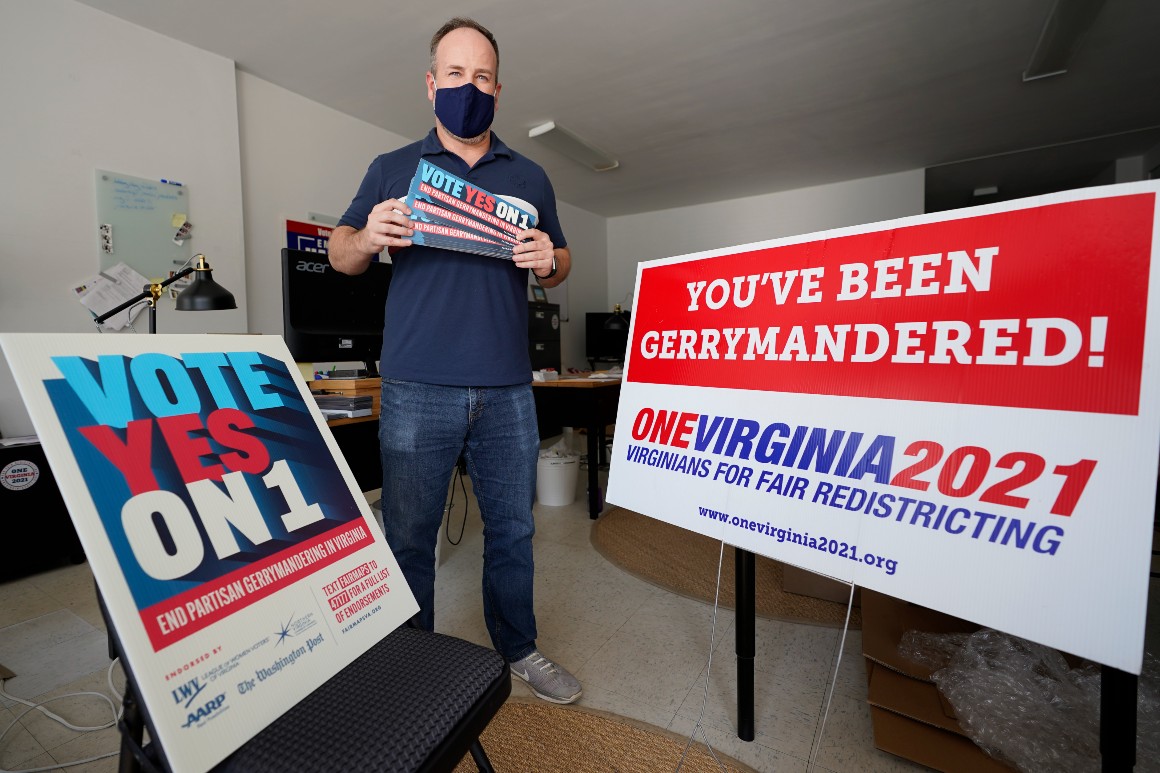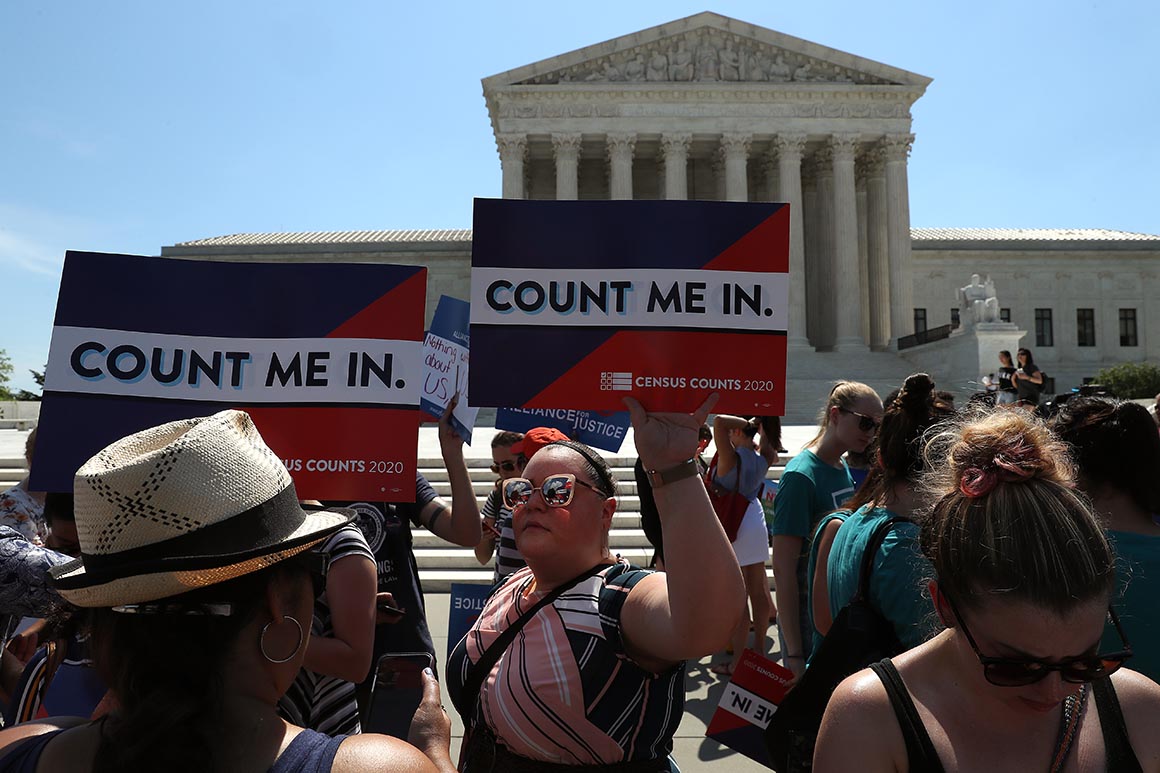
Virginia voters tried to take partisan gerrymandering out of redistricting by giving map-drawing power to a bipartisan commission.
Instead, party politics imploded the process.
A simple discussion last week in Richmond, about which maps to use as a baseline for drawing new legislative districts, ended with commissioners unable to agree on a starting point. Three Democratic members stormed out of the meeting, breaking up the quorum and reducing a staffer to the brink of tears. By Monday, the commission had missed its deadline for submitting new state legislative maps, as a Republican co-chair bemoaned “a fundamental lack of trust” poisoning the process.
The breakdown in Virginia is an extreme case — but it highlights the troubles plaguing some states that have turned their redistricting over to commissions. While they are often held up as the good-governance solutions to increase bipartisanship and reduce the power of parties and self-interested legislators in redistricting, commissions in states including Colorado, Michigan and Virginia have been fraught with partisan wrangling this year, yielding delays and dysfunction — and, sometimes, maps that will end up in court.
“Just a different path to the same place,” said Virginia state Del. Marcus Simon, a Democrat serving on his state’s commission.
“Maybe something like this could’ve worked 20 or 30 years ago, when we weren’t in such a polarized climate," Simon added, "where making nice with the other side wasn’t a betrayal of your whole tribe."
About a dozen states now incorporate a commission into their congressional map-drawing process, but each one is different. Some, like in California or Michigan, are led entirely by citizens, while others opt for a hybrid model that includes both voters and politicians, like in Virginia. In New York, Iowa and other places, state legislatures can ignore the commission’s input. Though it’s a messy landscape, redistricting reform advocates still argue that commissions are net positives, forcing redistricting out of the back rooms of state legislatures and into the open.
But “the problem has been in the execution,” said Josh Cohen, a Democratic consultant working with redistricting advocates in Virginia, Michigan and other states.
“Independent and bipartisan commissions were generally conceived with good intentions,” Cohen continued, but “in a lot of ways, they haven’t fulfilled their promise in terms of independence, representation or accessibility.”
In a few states, the commissions are feckless. New Mexico Democrats can ignore recommendations from their commission and pursue their goal of controlling all three districts in the state, up from the current 2-1 split. In Utah, the Legislature watered down a ballot measure that created a redistricting commission, relegating it to an advisory role.
Democrats in New York can also overrule their commission with their supermajority in the legislature. In Iowa, Republicans can amend their commission's third attempt at a map if they reject its first two proposals. Democrats there started sounding the alarm after Republicans declared they weren’t interested in the commission’s first map.
Yet it's commissions in place for the first time this decade have had the most trouble. In Colorado, commissioners had to scramble to pass congressional maps by voice vote just minutes before their deadline. The final vote came after a contentious six-hour marathon Zoom meeting, which ended with several of the 12 members crying. One Michigan citizen commissioner initially suggested including a Canadian city in one of their drafted maps.

Monday’s meeting in Virginia offered an extreme example of the dysfunction. Commissioners squabbled over whether one of the Democratic co-chairs formally resigned — she said she didn’t — and whether she could reinstate herself.
“You’re in this catch-22: You’re asking people to come together and overcome partisan division to end gerrymandering, but because of gerrymandering in the past, you have, perhaps, insurmountable partisan division,” said Liz White, executive director of One Virginia 2021, the group that backed the ballot initiative in Virginia.
But some Democrats still defend any effort to drag the process into the open.
"Commissions are better, for sure, than the political, partisan process — if for no other reason than you have transparency into what’s happening. Even if things go south, at least you know what’s happening,” said Kelly Ward Burton, president of the National Democratic Redistricting Committee, the group founded by former Attorney General Eric Holder. “On net, you do get fairer maps out of commissions.”
On the GOP side, many still maintain that giving redistricting power to commissions instead of legislatures is unconstitutional, though the Supreme Court rejected that argument in a 2015 case out of Arizona.
“We're stuck with them, whether we like them or not, in the places where they are, so you make the best of it and you work with them,” said Adam Kincaid, the executive director of the National Republican Redistricting Trust. “But these commissions are set up in a way where it favors Democrats and their liberal allies.”
In Colorado, however, some Democrats are frustrated that the commission did the opposite — drawing a map that doesn’t reflect the state’s trend to the left over the last decade. The commission approved a congressional map that would likely deliver four Democratic-leaning seats, three Republican-leaning seats and one new toss-up district.
"For the purposes of control of the House in 2022, that straight toss-up district will cause serious heartburn for national Democrats,” said Craig Hughes, a Democratic consultant based in Colorado. “We didn’t get a map that leverages that newfound blue-state status at all.”
And Republicans in Colorado, who otherwise would be shut out of the redistricting process entirely, count themselves fortunate.
“We got one, maybe two, competitive seats, which is a hell of a lot better than what the legislature would’ve generated,” said Josh Penry, a Republican consultant based in Colorado who worked to pass the ballot initiative creating the commission, which was ultimately backed by more than 70 percent of voters in 2018.
That feeling is shared by Michigan Democrats, who were shut out of redistricting a decade ago and saw Republicans draw some of the most gerrymandered districts in the country.
But the new bipartisan, citizen-run commission there has struggled to meet deadlines, eliminating several public hearings last month in order to devote more time to map-drawing. It's spent hours publicly debating how and where to draw lines, producing dozens of potential drafts. It's also struggled to keep up attendance among its 13 members.
“Since we've never actually been able to watch the process before it doesn't look as orderly as one would like it to look, but the result is all that matters and so far, what I've seen, there's at least an option of what looks like potentially a fair map,” said Rep. Dan Kildee (D-Mich.).
“These are people that by definition have never been involved in the process,” he added, “so I give them a wide berth, they're gonna make some mistakes along the way.”
And Michigan party operatives still expect the maps to end up mired in lawsuits. “I don’t think there’s any way, shape or form this process gets done without endless litigation,” said Jamie Roe, a Republican consultant based in Michigan.
The court is the last stop for Virginia's maps as well. The commission already punted their legislative maps to the justices and many believe the congressional maps are headed the same way. The Virginia Supreme Court tends to skew Republican, something giving Democrats additional anxiety.
“We've got a commission that is as dysfunctional, apparently, as we feared it would be,” said Rep. Gerry Connolly (D-Va.) “And it's unclear whether they're going to have any work product at all.”
----------------------------------------
By: Elena Schneider and Ally Mutnick
Title: Gridlock and dysfunction — and a few tears — hit redistricting
Sourced From: www.politico.com/news/2021/10/14/redistricting-gridlock-dysfunction-commissions-515964
Published Date: Thu, 14 Oct 2021 03:30:54 EST






